Making waves with Beth Dickens
- Zennor Glass

- Aug 15, 2018
- 7 min read
Marine conservation is the hot topic on everyone's lips right now, with so many inspiring thought leaders launching projects to improve the state of our oceans. We were lucky enough to catch up with Beth Dickens; who's amazing project: Zara Loko focuses on educating the children of Madagascar on the positive change they can make to ocean health through her beautiful artwork.

Our very own Lennie attended school with Beth, and has always known that she was going to do amazing things. 'Beth is a selfless and beautiful person inside and out who has given her heart to this project, if you have a love for the sea and an eye for beautiful artwork you will adore her work'.
ZG: Okay, so tell us about how the project all started?
Beth: I will try and summarise this very briefly! Okay, so long story short, I lived and worked in Madagascar for a year. I came back bursting with love, respect and gratitude for the country, but most of all for the people. I knew I had to do something to give back to the country and utilise all the knowledge I received. So, I’m using my love for art to make books!
Little note: the project is called ‘Zara Loko’, this is a Malagasy name. ‘Zara’ translates to ‘sharing’ and ‘loko’ to ‘colour’.

ZG:So we’re in love with the book, can you summarise what it is about? What message are you trying to convey?
Beth: Thankyou... it’s definitely a project of love! In a nutshell, I am creating a series of six, educational story books, based on conservation, for the young generation of Madagascar.
The books will be full of colourful and fun stories, with love and thought poured into each page. They are focussing on important conservational subjects of Madagascar: marine pollution, unsustainable fishing practices, the importance of forests, soil erosion, the importance of mangroves and the consequences of no mangroves during a cyclone.
Due to 64.7% of the people of Madagascar being illiterate, majority being in these rural areas, the books will be friendly for all levels of readers and non-readers. This will be achieved by the illustrations. The hand painted, bright illustrations will be designed to tell the whole story – the text being additional. They will be full of colour to represent this colourful country.
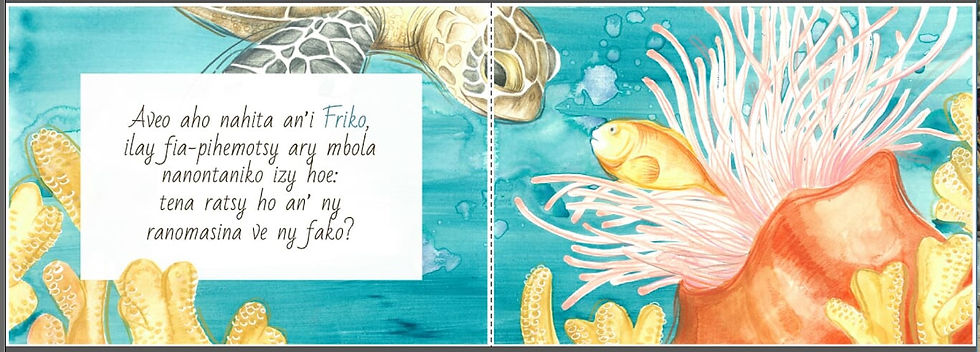
One of The important things for me is to make these books as relatable as possible for the children. I am packing as much Malagasy culture, traditions and wildlife as possible in to every book – and it is so much fun, the Malagasy culture is incredible! I really believe that this way the children will make more of a connection to the problems raised, therefore taking them more seriously.

It is simple, children are the future. The future peace makers, the future influencers, and most importantly for Madagascar, the future environmental leaders. With the current rate degradation, I can honestly say with personal experience, this education is more important than ever. We must try and install the passion and interest for wildlife while children are young. It only has the potential to grow and blossom.

I am working with a lovely, small, non-profit publishing company in Madagascar. The company is called Vakoka Vakiteny, which translates to ‘precious reading’. We are printing the books in Madagascar and freely distributing the books to as many schools as possible! Just the thought of this is so exciting, it fills me with so much joy!
ZG: You are obviously incredibly artistically talented! Where would you say your passion for art has come from? What is your favourite piece of art you’ve created?
Beth: Thank you! My passion for art has been with me my whole 21 years. I don’t really know where it came from (actually, probably my Mom), it is just well and truly, and always will be, a part of me! Since a child I have loved to just create, anything and everything. Back then I would have never realised how it would guide my life the way it has. It has helped me grow as a person, taught me things about myself, made me hate myself, love myself, seen me through the ups and downs of life, and now it is taking me on this journey!
My favourite piece... well, I love making art for other people. Either for presents or simply reminding them of their importance to me. Whenever they like it, I love the piece for the joy I was able to give someone else. I’ve been through many different styles and phases, but my favourites are always the pieces that come from the heart. This project, Zara Loko, truly comes from somewhere deep within. It is definitely my favourite because I really think it has massive potential to do something very good and necessary.

ZG: So why Madagascar? Where did the journey start and what is the conservation status there?
Beth: I have this massive curiosity with the African continent. It just endears me; it has for years and I think always will. After volunteering with Wild Dog Conservation in South Africa, I had an urge to learn more about marine conservation. Naturally, I was pulled to the African continent. The country ended up being Madagascar, and man, I’m so grateful it was (Actually, Madagascar isn’t as African as I first though, it’s first descendants where actually from Indonesia)! This country has enriched my life like I never thought it could. It has filled me with joy, showed me the beauty of the human spirit, more of the beauty of nature, the richness and importance of community, kindness and people. I honestly have so much to thank it for.

Anyway, after my internship, I just could not imagine myself anywhere else and I managed to get a job. My job was teaching marine conservation to the kids from our local village. It made me realise how important education is within conservation – without education, conservation is nothing. And it all really started from there.
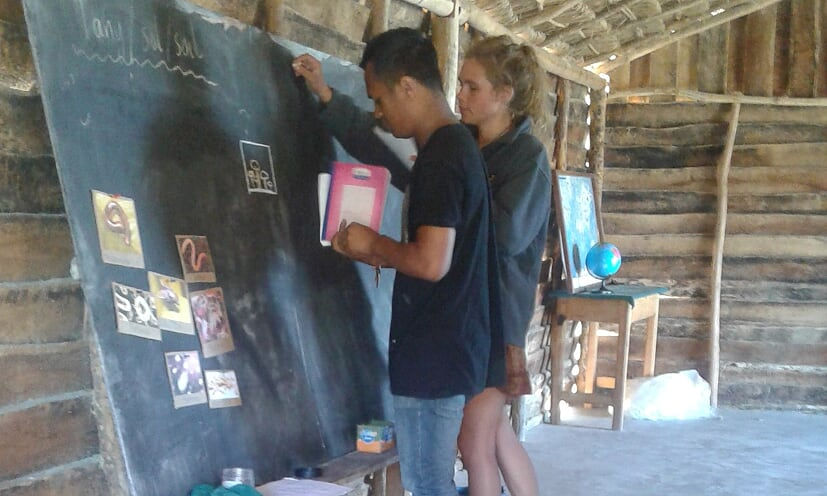
The conservation status is poor. Many people know Madagascar for its gorgeous, rich diversity of wildlife and endemism – It is one of the many things that makes this island so special. David Attenborough, as usual, puts this into lovely words: ‘This Eden is still a place of wonder and magic. Something, surely, worth protecting.’ But, sadly, this ‘place of wonder’ is very threatened.
Deforestation here has happened on a scarily large scale. Alarmingly, Madagascar has lost 90% of its originally forests since the arrival of humans around 2,000 years ago. 80% of this was lost just in the last 30 years. This in turn, along with over exploitation & global warming, is destroying the coral reef that so many Malagasy rely on. Madagascar has the world’s 3rd largest coral reef system, which is slowly, but surely dying. With an annual population increase of 2.8%, the severity of this degradation will
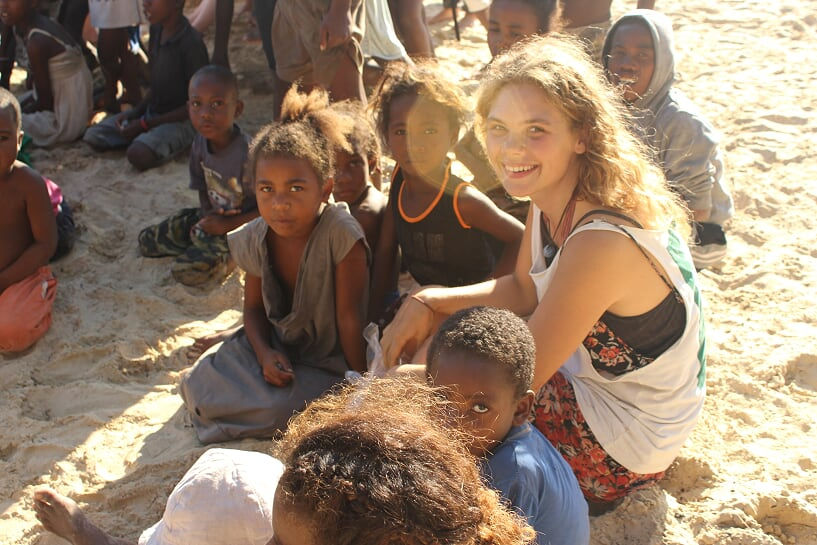
only increase. And being one of the poorest countries in the world (ranked 5th in 2015) most natives’ minds, understandably, are not thinking about conservation.
There are many NGO’s working for the environment in Madagascar. However, the real change will only happen when the drive comes from the people to which this beautiful land belongs. The people are some of the very greatest I’ve met, they are more than capable.
ZG: From your experience, why is conservation so important?
Beth: Very simply, we rely on this earth for life, all of us, animals and humans. Yet the strange thing is that we still continue to destroy it, some of us don’t have a choice but many do it just out of convenience of an easy life. The protection and conservation of our crazily beautiful earth is everyone’s responsibility. There is, once again, a quote by David Attenborough, who sums this up very nicely, ‘Cherish the natural world because you are a part of it and you depend on it’. Whether its preventing animals being poached, protecting an ecosystem many rely on or doing our part to slow down global warming, it is all our responsibility!

It’s crazy to think how our damaging actions can affect people we have never met. Where I was working in Madagascar, we were working with the Vezo tribe. These are people who live off the sea. It is a tough life. Their whole livelihood depends on a dying coral reef. Why is the coral reef dying? Many factors, bad fishing practices, over fishing, sedimentation to name a few, but also global warming. The seas are warming and the coral is dying, all over the world. Our actions of making our life easier are completing ruining the life of others. This is real. You may never meet these people, but it is true and it is happening.
This isn’t the most uplifting answer in the world, but I hope it answers the question!
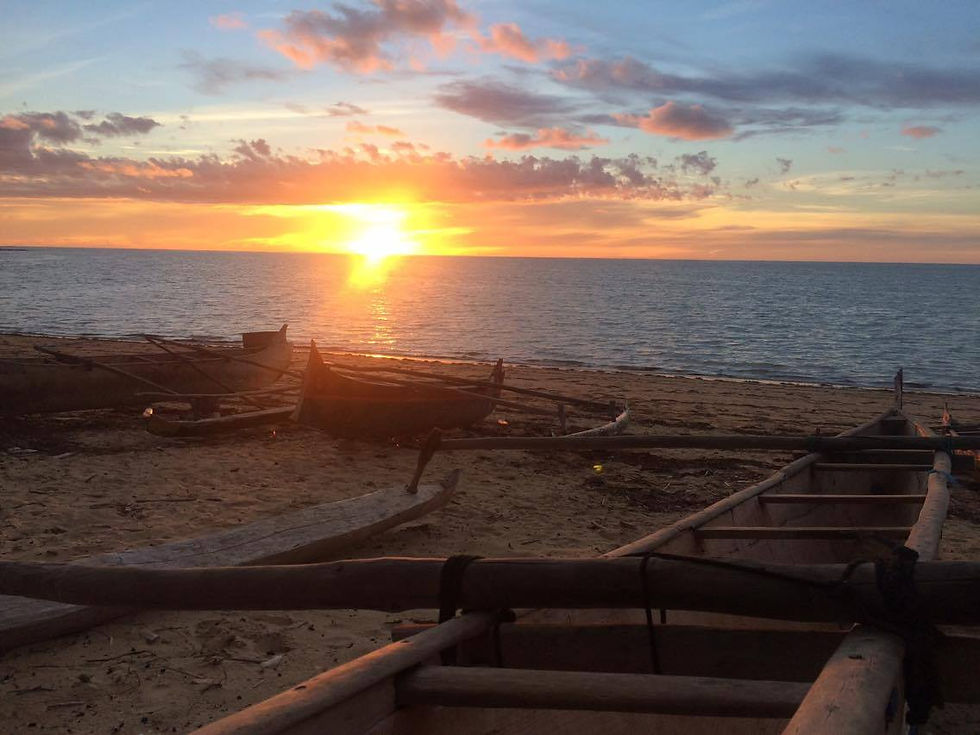
ZG: Describe your favourite moment where you’ve been in/by the water.
Beth: To be honest, there has never been a big moment, just little, sweet ones. One of my favourite memories will always be swimming and unwinding in the warm, turquoise bay after work with my lovely friends. Being able to watch the African sunset and fisherman paddling in from a day fishing whilst feeling so small, free and connected is a feeling I will always keep in my heart.
The warm orange glow on the ocean surface always filled my heart to the brim
ZG: Why should people donate to your beautiful book?
From the bottom of my heart, I can say these books are very important. By no means do I except to fix the huge environmental problems faced by Madagascar in just 6 books. What I do want is to spark that initial interest. I want to make that flower blossom within the hearts of the Malagasy children, that’s where it will all start.

I just want to say that neither me nor the publishing company are making money from these books. We are doing it because we care and we love the country too much to do nothing. We are having to raise all the money ourselves to distribute as many books as possible. All your money will go to inspiring the desperately needed future environmental leaders of this wonderful, heart capturing country.
Thank you so much for reading this and thank you so much to the girls at Zennor glass for doing this. Their work raising awareness of marine pollution and sharing people appreciation for the ocean is inspiring.
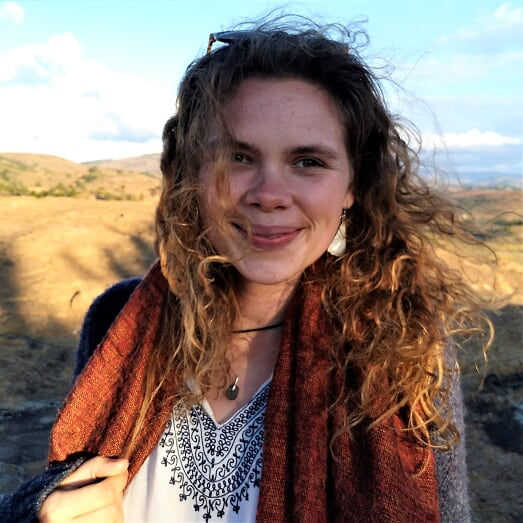
If you are as inspired by Beth's words as we are and would like to help her distribute her books to schools around Madagascar then head to our collection of Zara Loko necklaces. The necklaces are inspired by the project and 50% of the profits are going towards distributing these amazing books.
https://www.zennorglass.com/shop-3
If you would like to donate, please visit Beth's fundraiser page: https://www.justgiving.com/crowdfunding/beth-dickens
If you would like to learn more about the project and follow the journey of these books, please visit her blog: https://bethanyrosedickens.wixsite.com/mysite/blog








Comments